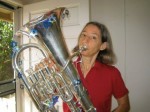By Emily Nye

SAN DIEGO — To tell the story of Honorable Menschen, San Diego’s newest amateur klezmer band, I must take you through my klezmer awakening. When I first heard klezmer music as a young woman, my body responded before my brain: my toes tapped, my torso vibrated, and I wanted to dance. This was “my” music! This visceral connection with my Jewish heritage is what fuels my passion to make and share klezmer music today.
Learning about klezmer took me down a few different roads, first as a member of the Nahalot Shalom Community Klezmer Band in Albuquerque, New Mexico, and then in a class with David Rosenfield at the Palo Alto (California) JCC. Eventually I understood some basics of klezmer. This music expresses the joys and sorrows we experience throughout our celebrations and rites of passage, including weddings, funerals, and bar/bat mitzvahs. A klezmer band creates catchy, sometimes haunting melodies (usually played by instruments like clarinet, violin, or trumpet), accompanied by rhythm, bass, accordion, and percussion instruments to drive the beat.
Playing in a klezmer band links each musician to a time and place in Jewish history. For many centuries, instrumental music was banned in Jewish religious ceremonies and services, as it was thought to be obscene. This posed a challenge. What is a wedding without a lively procession or a heartfelt serenade to honor the happy couple? Groups of roving musicians formed throughout eastern Europe, traveling from village to village to provide dance music. By the 1800s, these “klezmorim” lived and traveled throughout Russia, Germany, and Romania, to name just a few countries where this music evolved. Jewish leaders eventually eased the ban on music. Klezmer music spread as Jews immigrated to the United States and other points around the globe.
When I moved to San Diego in 2013, I was eager to learn about the klezmer community. When I asked around, one name came up repeatedly, though given his reputation I was shy to contact him. Yale Strom is a world-renowned klezmer performer, composer, ethnographer, filmmaker, and San Diego State artist-in-residence. Not only did Yale respond immediately to my inquiry about how to get involved in the klezmer community, but he offered to provide some direction and music. Networking with Yochanan Winston of Congregation Beth-El and Myrna Cohen of Temple Emanu-El, I was able to rustle up a core of musicians interested in learning about and playing klezmer. Through monthly practice with Yale at Temple Emanu-El and meeting at least every other week at each others’ homes, Honorable Menschen was born (we were first known as Klezmer Del Cerro).
Studying klezmer with Yale Strom has been a transformative experience. It doesn’t seem possible that a violin could produce the range of notes, improvised melodies, and voices of joy and sorrow expressed by Yale. It is amazing to watch him patiently encourage a group of intermediate-level musicians to improvise and stray from our trusted sheet music. Yale provided our first several tunes (from his Absolutely Complete Klezmer Songbook anthology), which we played at our first gig last December at the lunch reception welcoming Rabbi Devorah Marcus to Temple Emanu-El. In fact, we played the same four tunes over and over for 45 minutes. However, we now have a repertoire of 20 songs and have played at several events.
Honorable Menschen is composed of Frank Borkat, clarinet, Karla Ober, flute and vocals, Becky Bar-Lev Henning, flute; Roni Breite, guitar and harmonica; Jack Pipkin, mandolin; Ron Reff, electric and bass guitars, Pattie Schecter Urie, violin, and Jay Shirley, percussion. I play the euphonium (also called baritone horn), which is a tenor tuba.
This was the instrument I played in band growing up, and I was fairly proficient by the time I was 18. I put away my instrument — for about 26 years. I mention this because returning to music as an adult, and playing with other mostly middle-aged and older musicians, is part of what makes the klezmer experience so special. After hearing our first performance, Frank Borkat, who had not played his clarinet for 32 years, dusted off his instrument, brushed up his skills, and now enjoys playing again with our lively group.
If this story resonates with you, and you are (or were) an intermediate level musician interested in playing klezmer, we invite you to sit with us at an Honorable Menschen practice. We will be playing at no charge at various senior facilities — if you know one that might appreciate our music, tell us about it.
*
For more information about Honorable Menschen, contact Emily Nye at efnye@yahoo.com or Roni Breite at rnbrtsd@cox.net